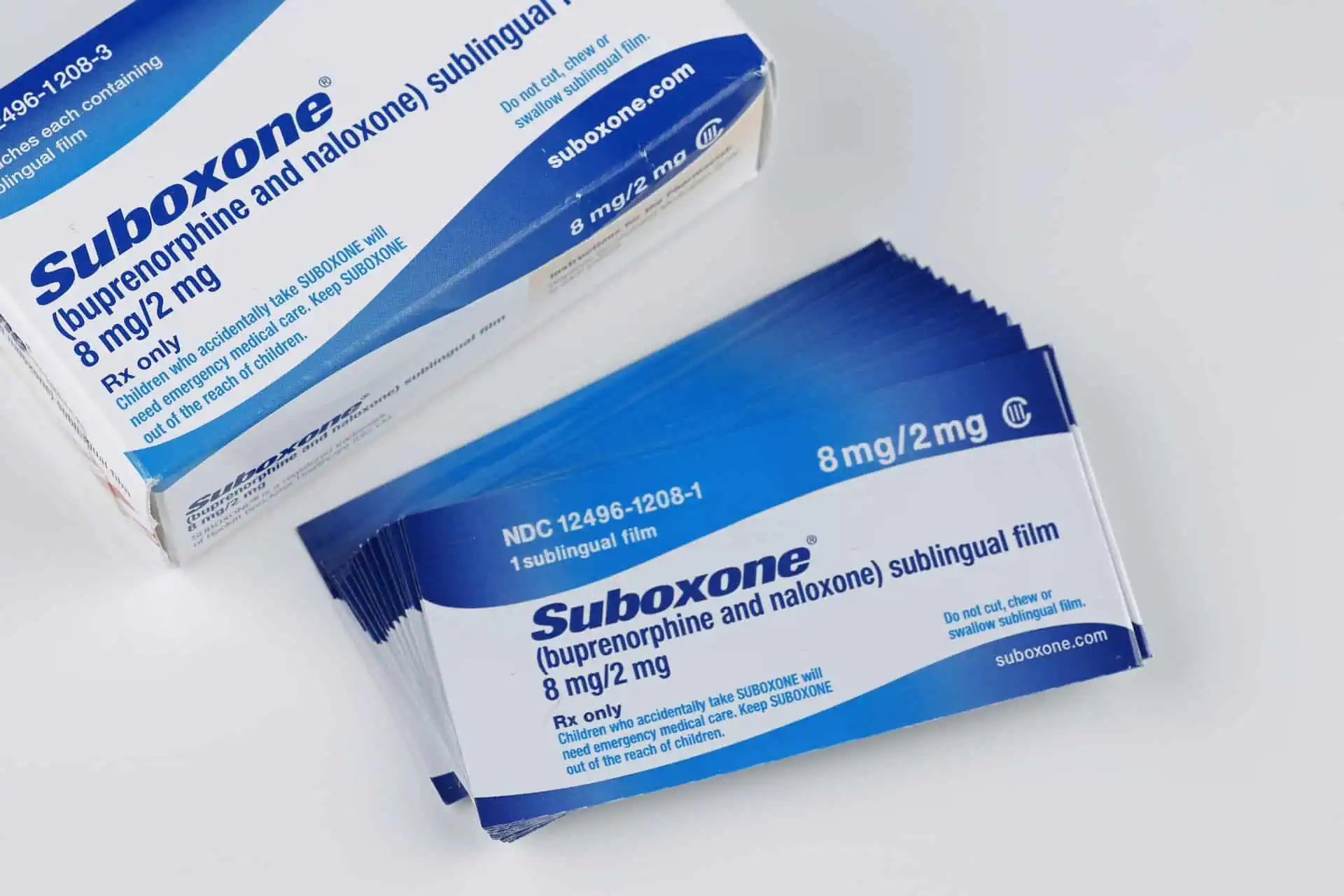FAQ: Does Suboxone Rot Your Teeth?
- Last Updated: July 14th, 2025

Attorney Jessica Paluch-Hoerman, founder of TruLaw, has over 28 years of experience as a personal injury and mass tort attorney, and previously worked as an international tax attorney at Deloitte. Jessie collaborates with attorneys nationwide — enabling her to share reliable, up-to-date legal information with our readers.
Legally Reviewed
This article has been written and reviewed for legal accuracy and clarity by the team of writers and legal experts at TruLaw and is as accurate as possible. This content should not be taken as legal advice from an attorney. If you would like to learn more about our owner and experienced injury lawyer, Jessie Paluch, you can do so here.
Fact-Checked
TruLaw does everything possible to make sure the information in this article is up to date and accurate. If you need specific legal advice about your case, contact us by using the chat on the bottom of this page. This article should not be taken as advice from an attorney.
Key takeaways:
- Suboxone, a medication commonly used to treat opioid dependence, has raised concerns about dental health.
- Given its method of administration—typically dissolved under the tongue or inside the cheek—patients and healthcare providers have noted incidents of dental issues.
- As Suboxone contains buprenorphine, research suggests there may be a correlation between long-term use and oral health problems.
FAQ: Does Suboxone Rot Your Teeth?
On this page, we’ll answer the question “Does Suboxone Rot Your Teeth?” to discuss an overview of common dental problems associated with Suboxone, potential side effects of Suboxone sublingual strips, and much more.

Intro to Suboxone Strips Causing Tooth Rot
Studies have shown that Suboxone treatment can lead to several dental concerns:
- Suboxone Treatment: Aimed to alleviate opioid addiction, the prescribed medication combines buprenorphine with naloxone.
- How It’s Used: Patients are typically advised by their physician to place Suboxone strips under the tongue for dissolution to manage symptoms of withdrawal and reduce cravings.
- Dental Health Concerns: Prolonged exposure to sublingual buprenorphine could potentially lead to dental issues, such as tooth extractions or deterioration.
- FDA Guidance: Recent statements by the FDA have highlighted the risks of dental problems from buprenorphine medicines dissolved in the mouth.
If you or a loved one has experienced severe tooth decay, deteriorating dental health, or dental injuries after taking Suboxone, you may be eligible to pursue compensation.
Contact TruLaw using the chat on this page for a free and instant case evaluation to find out if you qualify today.
Table of Contents
The Oral Health Debate: Suboxone and Its Effects
The discussion surrounding Suboxone and its potential impact on oral health is centered around its mode of administration and the prescribed treatment regimen.
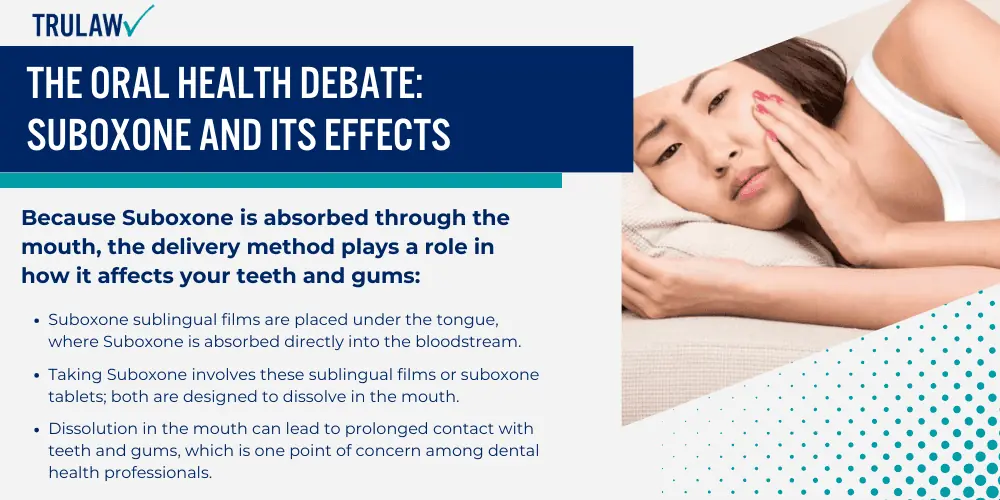
Given its method of administration—typically dissolved under the tongue or inside the cheek—patients and healthcare providers have noted incidents of dental issues.
Methods of Taking Suboxone
Suboxone is available in forms meant to be absorbed through the mucous membranes.
Crucially, the method of taking Suboxone influences its interaction with oral tissues.
Because Suboxone is absorbed through the mouth, the delivery method plays a role in how it affects your teeth and gums:
- Suboxone sublingual films are placed under the tongue, where Suboxone is absorbed directly into the bloodstream.
- Taking Suboxone involves these sublingual films or suboxone tablets; both are designed to dissolve in the mouth.
- Dissolution in the mouth can lead to prolonged contact with teeth and gums, which is one point of concern among dental health professionals.
- Healthcare providers generally advise patients to avoid eating or drinking immediately after taking the medication to ensure proper absorption.
Dosage and Treatment Regimens
A physician-prescribed suboxone film regimen is tailored to treat opioid use disorder effectively.
It’s a nuanced plan that balances opioid addiction treatment needs with potential side effects, including those affecting dental health.
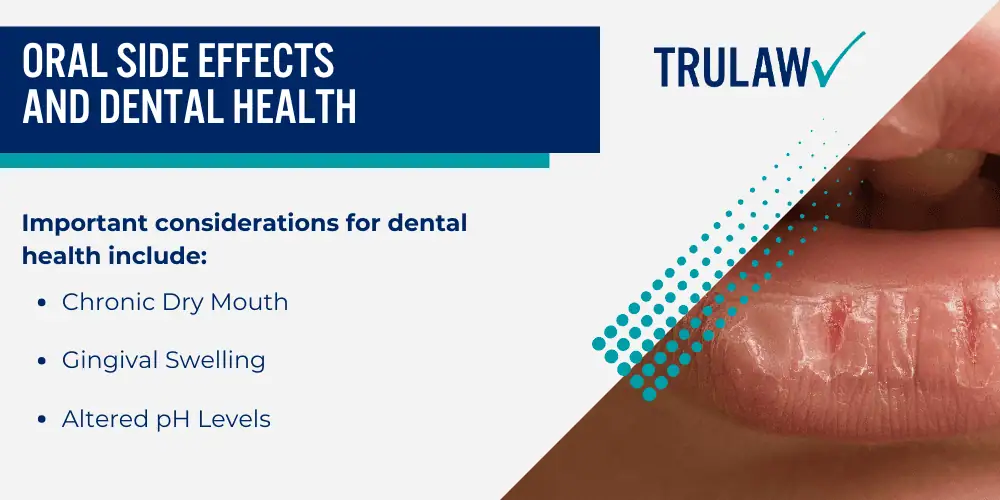
Here’s how a typical Suboxone treatment plan unfolds:
- The typical Suboxone treatment begins with an induction phase, where dosages are adjusted to mitigate withdrawal symptoms.
- Maintenance involves a steady dose of prescription Suboxone film or tablets, determined by the response to treatment.
- Long-term treatment regimens are common, necessitating ongoing monitoring of oral health.
- Regular dental evaluations become part of the comprehensive approach to Suboxone as a medication for opioid addiction treatment.
Scientific Perspectives on Suboxone and Oral Health
Suboxone, a medication used to treat opioid addiction, has been scrutinized for its potential impact on oral health.
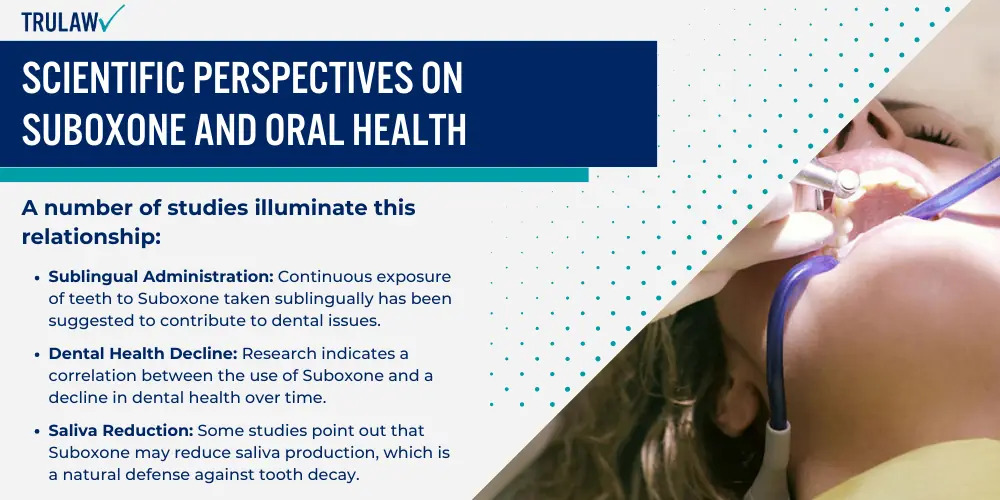
Research Findings: What Studies Say About Suboxone and Teeth
The scientific community has investigated the connection between Suboxone and dental health.
A number of studies illuminate this relationship:
- Sublingual Administration: Continuous exposure of teeth to Suboxone taken sublingually has been suggested to contribute to dental issues.
- Dental Health Decline: Research indicates a correlation between the use of Suboxone and a decline in dental health over time.
- Saliva Reduction: Some studies point out that Suboxone may reduce saliva production, which is a natural defense against tooth decay.
- Caries Formation: There is evidence of caries risk assessment in patients who use Suboxone regularly.
Expert Opinions: Dental Professionals Weigh In on the Matter
Dental professionals have provided insight into the impact of Suboxone on oral health.
Their perspectives show a consensus on several points:
- Risk Awareness: They emphasize the importance of patient awareness regarding oral health risks associated with Suboxone.
- Preventative Measures: Dentists often recommend increased dental hygiene for patients prescribed Suboxone.
- Early Intervention: Seeking early dental consultations when problems arise is encouraged to mitigate potential oral health issues.
- Communication: Open communication between dental practitioners and patients is vital to managing and preventing oral health complications.
- Professional Statements: and recommendations can be found in resources such as FDA advisories.
Common Dental Problems Associated with Suboxone Use
Suboxone, a medication used to treat opioid dependency, has been linked to various dental health concerns.
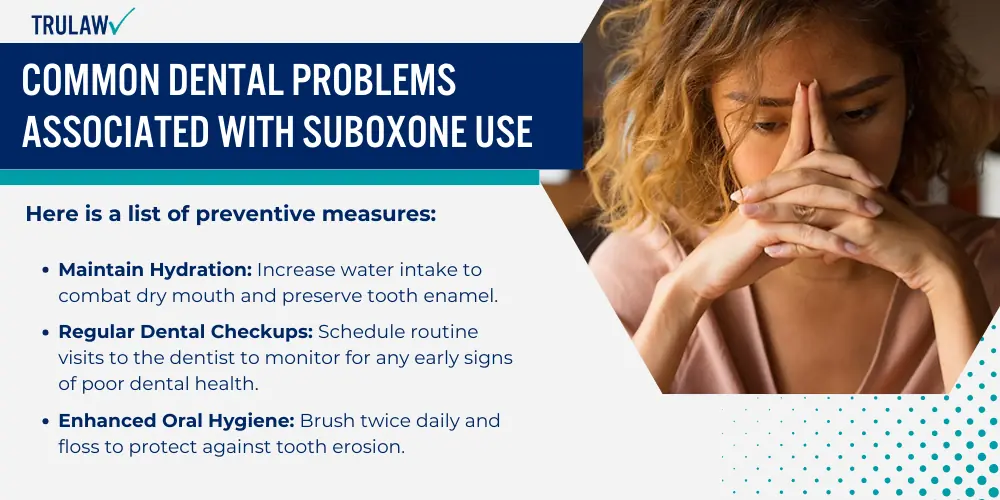
While it is vital for managing addiction, patients need to be aware of the associated oral health risks.
Impact on Oral Health: Preventive Care for Suboxone Users
Suboxone can cause dry mouth, which in turn increases the risk of dental issues such as severe tooth decay, dental caries, and oral infections.
Consequently, preventive care is essential for individuals using Suboxone to mitigate these risks.
Here is a list of preventive measures:
- Maintain Hydration: Increase water intake to combat dry mouth and preserve tooth enamel.
- Regular Dental Checkups: Schedule routine visits to the dentist to monitor for any early signs of poor dental health.
- Enhanced Oral Hygiene: Brush twice daily and floss to protect against tooth erosion.
- Sugar-Free Products: Use sugar-free gum or lozenges to stimulate saliva production.
Treatment Options for Dental Issues in Suboxone Users
When Suboxone users experience dental problems, several treatment paths must be considered.
Prompt action can prevent further deterioration and safeguard oral health.
The following treatment options should be explored:
- Restorative Dentistry: Procedures such as fillings can repair damage caused by dental caries.
- Medication Adjustments: Consult a healthcare provider about possibly altering the Suboxone regimen to reduce oral health issues.
- Specialized Mouthwash: Prescriptions for mouthwashes designed to alleviate dry mouth symptoms can help.
- Dental Surgery: In extreme cases of tooth loss or advanced decay, surgical interventions may be necessary.
Potential Side Effects of Suboxone Sublingual Strips
Suboxone sublingual strips, used in the treatment of opioid dependence, have been associated with certain oral side effects.
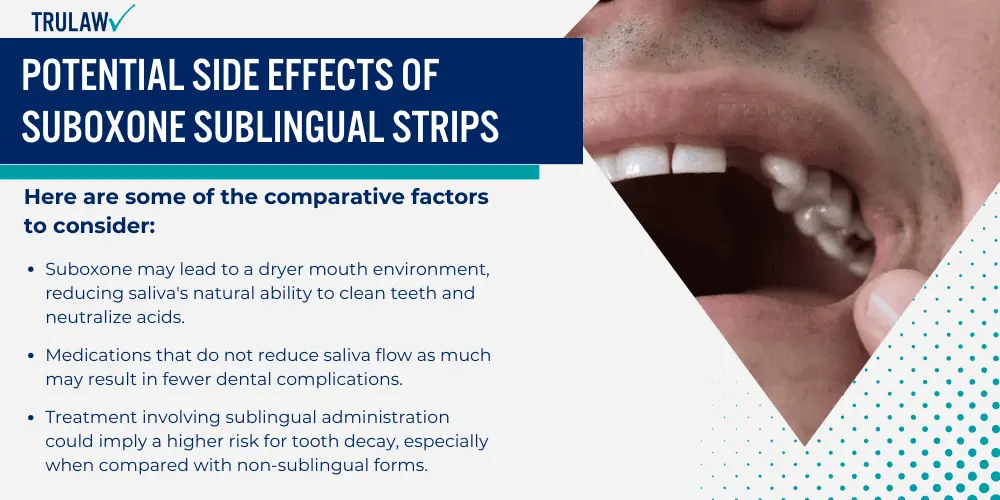
Patients and healthcare providers need to be aware of these potential risks to dental health, particularly concerning tooth decay.
Comparing Suboxone to Other Medications: Oral Health Impacts
When considering the impact on oral health, Suboxone has been linked to dental issues that could be more pronounced compared to other medications not administered sublingually.
This is because the active ingredient in Suboxone may reduce saliva production, which is critical to maintaining oral health.
Here are some of the comparative factors to consider:
- Suboxone may lead to a dryer mouth environment, reducing saliva’s natural ability to clean teeth and neutralize acids.
- Medications that do not reduce saliva flow as much may result in fewer dental complications.
- Treatment involving sublingual administration could imply a higher risk for tooth decay, especially when compared with non-sublingual forms.
- Some patients using Suboxone might require more frequent dental check-ups to monitor and manage potential dental issues.
Oral Side Effects and Dental Health
Suboxone sublingual strips introduce buprenorphine directly into the mouth, with potential side effects that can include oral health problems such as tooth decay.
These side effects have led to dental treatments for some patients.
Important considerations for dental health include:
- Chronic Dry Mouth: This can contribute to advanced tooth decay as it accelerates the growth of harmful bacteria.
- Gingival Swelling: Some individuals may experience gum swelling, which can complicate oral hygiene and lead to extensive dental procedures.
- Altered pH Levels: The oral cavity’s altered environment may favor acidic conditions, leading to extensive tooth decay.
Patients have reported needing extensive dental treatment after long-term use, including dental surgery in some cases.
Patients on Suboxone therapy must maintain regular dental hygiene and seek professional dental assessments to guard against worsening dental health.
For more information about the link between Suboxone and oral health, visit the FDA’s statements regarding these concerns.
Legal Concerns and Challenges With Insurance Companies
A rising number of Suboxone lawsuits may spur negotiations with insurers to characterize the intersection of legal and insurance challenges related to Suboxone-induced tooth decay.
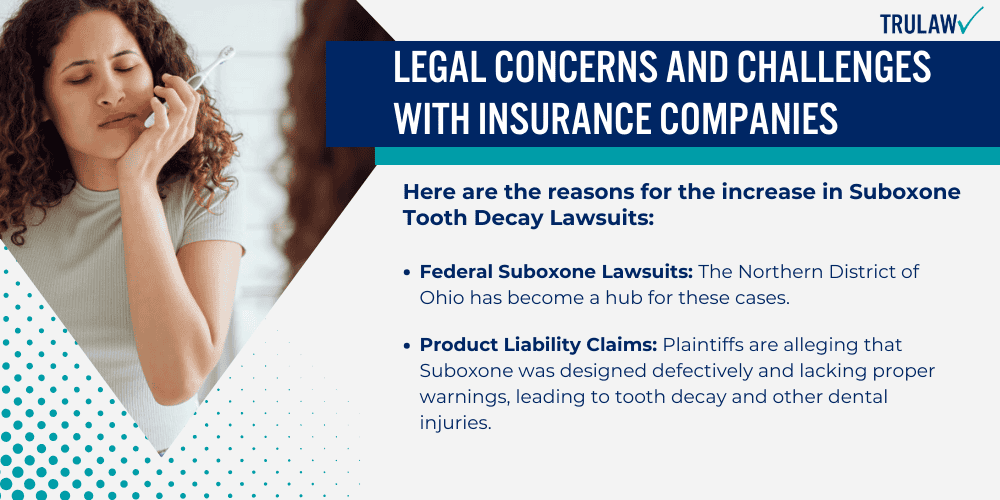
Suboxone Tooth Decay Lawsuits: Increased Reports
Individuals who have suffered dental injuries such as tooth decay or cracked teeth after using Suboxone may consider legal action.
Suboxone tooth decay lawsuits are being filed against manufacturers, alleging lack of proper warnings and negligence.
Here are the reasons for the increase in Suboxone tooth decay lawsuits:
- Federal Suboxone Lawsuits: The Northern District of Ohio has become a hub for these cases.
- Class Action Status: Some seek to establish a suboxone tooth decay lawsuit for broader claimant representation.
- Product Liability Claims: Plaintiffs are alleging that Suboxone was designed defectively and lacking proper warnings, leading to tooth decay and other dental injuries.
- Potential for Substantial Compensation: Victims may receive compensation for damages, including dental repair costs and associated pain and suffering.
Suboxone MDL No. 3029: Can I Still Join The Suboxone MDL?
The Panel on Multidistrict Litigation (MDL) has consolidated federal Suboxone product liability lawsuits to manage many cases that share common issues more efficiently.
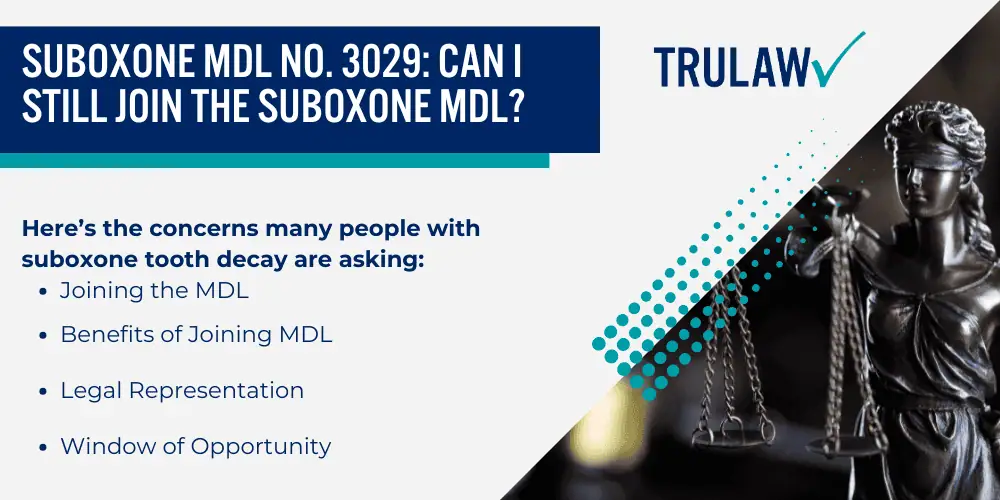
Here’s the concerns many people with suboxone tooth decay are asking:
- Joining the MDL: Individuals with claims of suboxone tooth decay litigation might still be able to join the existing MDL No. 3029.
- Benefits of Joining MDL: Benefits include shared pretrial proceedings, which can lead to faster resolution compared to separate suboxone teeth lawsuits.
- Legal Representation: Finding a knowledgeable Suboxone lawyer can significantly impact the likelihood of a successful claim.
- Window of Opportunity: The timeframe for joining the MDL is subject to legal deadlines, so potential claimants should act promptly.
Navigating the insurance aspect involves demonstrating that tooth decay and dental issues are directly related to Suboxone use.
This is a challenge that insurance companies are typically hesitant to acknowledge such correlations without clear and concrete evidence.
Suboxone Lawsuit Frequently Asked Questions
-
When Suboxone medication is dissolved in the mouth, it can lead to various dental issues such as tooth decay, cavities, and mouth infections.
It is important to consult a dentist if you experience any of these symptoms and compile as much documentation as possible pertaining to your injuries.
-
Yes, Suboxone use has been linked to tooth decay, even in the absence of other dental issues.
This side effect has been reported by patients, so it’s important to be aware of the potential impact on dental health when using Suboxone.
Regular dental check-ups and good oral hygiene practices are essential for anyone using Suboxone to help prevent or address tooth decay.
-
It is important to note that erosion and complete tooth loss have been identified as potential side effects for some individuals undergoing treatment with Suboxone.
This emphasizes the importance of regular dental check-ups and proper oral hygiene practices for those receiving Suboxone treatment.
-
Suboxone can have a detrimental impact on oral health.
One of its side effects is the reduction of saliva production, which creates a dry mouth environment.
This lack of saliva can lead to an increased risk of tooth decay and gum disease, as saliva plays a crucial role in maintaining oral health by helping to rinse away food particles, neutralize acids, and prevent bacterial overgrowth.
-
There have been reports of legal cases initiated by individuals who suffered dental problems allegedly caused by Suboxone; however, each case’s outcomes depend on its particular circumstances and available evidence.
For detailed guidance on maintaining oral health during Suboxone treatment, refer to the FDA’s insights.
-
Suboxone can cause dry mouth, which can increase the risk of cavities and other dental problems.
Preventative dental care tailored for those on Suboxone treatment can be coordinated with a dentist or found in guidelines like those provided by IHS regarding medication safety.

Managing Attorney & Owner
With over 25 years of legal experience, Jessica Paluch-Hoerman is an Illinois lawyer, a CPA, and a mother of three. She spent the first decade of her career working as an international tax attorney at Deloitte.
In 2009, Jessie co-founded her own law firm with her husband – which has scaled to over 30 employees since its conception.
In 2016, Jessie founded TruLaw, which allows her to collaborate with attorneys and legal experts across the United States on a daily basis. This hypervaluable network of experts is what enables her to share the most reliable, accurate, and up-to-date legal information with our readers!
Additional Suboxone Lawsuit resources on our website:
Here, at TruLaw, we’re committed to helping victims get the justice they deserve.
Alongside our partner law firms, we have successfully collected over $3 Billion in verdicts and settlements on behalf of injured individuals.
Would you like our help?
At TruLaw, we fiercely combat corporations that endanger individuals’ well-being. If you’ve suffered injuries and believe these well-funded entities should be held accountable, we’re here for you.
With TruLaw, you gain access to successful and seasoned lawyers who maximize your chances of success. Our lawyers invest in you—they do not receive a dime until your lawsuit reaches a successful resolution!
AFFF Lawsuit claims are being filed against manufacturers of aqueous film-forming foam (AFFF), commonly used in firefighting.
Claims allege that companies such as 3M, DuPont, and Tyco Fire Products failed to adequately warn users about the potential dangers of AFFF exposure — including increased risks of various cancers and diseases.
Depo Provera Lawsuit claims are being filed by individuals who allege they developed meningioma (a type of brain tumor) after receiving Depo-Provera birth control injections.
A 2024 study found that women using Depo-Provera for at least 1 year are five times more likely to develop meningioma brain tumors compared to those not using the drug.
Suboxone Tooth Decay Lawsuit claims are being filed against Indivior, the manufacturer of Suboxone, a medication used to treat opioid addiction.
Claims allege that Indivior failed to adequately warn users about the potential dangers of severe tooth decay and dental injuries associated with Suboxone’s sublingual film version.
Social Media Harm Lawsuits are being filed against social media companies for allegedly causing mental health issues in children and teens.
Claims allege that companies like Meta, Google, ByteDance, and Snap designed addictive platforms that led to anxiety, depression, and other mental health issues without adequately warning users or parents.
Transvaginal Mesh Lawsuits are being filed against manufacturers of transvaginal mesh products used to treat pelvic organ prolapse (POP) and stress urinary incontinence (SUI).
Claims allege that companies like Ethicon, C.R. Bard, and Boston Scientific failed to adequately warn about potential dangers — including erosion, pain, and infection.
Bair Hugger Warming Blanket Lawsuits involve claims against 3M — alleging their surgical warming blankets caused severe infections and complications (particularly in hip and knee replacement surgeries).
Plaintiffs claim 3M failed to warn about potential risks — despite knowing about increased risk of deep joint infections since 2011.
Baby Formula NEC Lawsuit claims are being filed against manufacturers of cow’s milk-based baby formula products.
Claims allege that companies like Abbott Laboratories (Similac) and Mead Johnson & Company (Enfamil) failed to warn about the increased risk of necrotizing enterocolitis (NEC) in premature infants.
Here, at TruLaw, we’re committed to helping victims get the justice they deserve.
Alongside our partner law firms, we have successfully collected over $3 Billion in verdicts and settlements on behalf of injured individuals.
Would you like our help?
